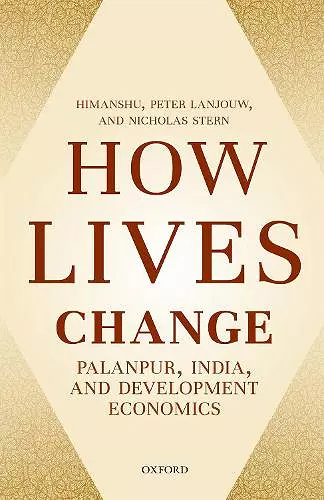How Lives Change
Palanpur, India, and Development Economics
Nicholas Stern author Peter Lanjouw author Himanshu author
Format:Hardback
Publisher:Oxford University Press
Published:22nd Aug '18
Currently unavailable, and unfortunately no date known when it will be back

Development economics is about understanding how and why lives change. How Lives Change: Palanpur, India, and Development Economics studies a single village in a crucially important country to illuminate the drivers of these changes, why some people do better or worse than others, and what influences mobility and inequality. How Lives Change draws on seven decades of detailed data collection by a team of dedicated development economists to describe the evolution of Palanpur's economy, its society, and its politics. The emerging story of integration of the village economy with the outside world is placed against the backdrop of a rapidly transforming India and, in turn, helps to understand the transformation. It puts development economics into practice to assess its performance and potential in a unique and powerful way to show how the development of one village since India's independence can be set in the context of the entire country's story. How Lives Change sets out the role of, and scope for, public policy in shaping the lives of individuals. It describes how changes in Palanpur's economy since the late 1950s were initially driven by the advance of agriculture through land reforms, the expansion of irrigation and the introduction of "green revolution" technologies. Since the mid-1980s, newly emerging off-farm opportunities in nearby towns and outside agriculture became the key driver of growth and change, profoundly influencing poverty, income mobility, and inequality in Palanpur. Village institutions are shown to have evolved in subtle but clear ways over time, both shaping and being shaped by economic change. Individual entrepreneurship and initiative is found to play a critical role in driving and responding to the forces of change; and yet, against a backdrop of real economic growth and structural transformation, this book shows that human development outcomes have shown only weak progress and remain stubbornly resistant to change.
How Lives Change is a remarkable book which brings together two qualities seldom seen concurrently-empathy for the subject, in this case the inhabitants of Palanpur, usually found in anthropological writings, and the rigor of statistics and theory, associated with economics. This new book provides a keen, bird'seye view of research in rural India, with scholarship and a lightness of touch rare in economics. What makes this latest book especially valuable is the authors' use of Palanpur as a testing ground of what has happened all over India. The experience of Palanpur is used by the authors to offer useful tips to India-the importance of education, human capital and better vocational training, and the need for even greater connectivity to towns and cities. * Kaushik Basu, Cornell University *
For development economists, this fascinating book about 60 years of development in a poor Indian village reads like a saga, yet a saga that tells not only about the lives of people and how they changed throughout three generations in parallel with the transformation of India, but also about the relevance of development theory in understanding the causes and the features of change. An absolute "must-read" book. * François Bourguignon, emeritus professor Paris School of Economics, Former Chief Economist of the World Bank *
How Lives Change is the outcome of the latest in a unique, and continuing, series of studies of the lives and livelihoods for all the households in one village in the largest state of India over seven decades. It is a landmark in the interface of development economics and economic anthropology, focusing on drivers of economic and social transformation, and on interaction of markets, institutions and opportunities, and deriving lessons for development theory and policy. There is much to learn from this in-depth study. * Pranab Bardhan, University of California at Berkeley *
The three Palanpur volumes are a monument to serious social science; social science at its best. I don't know of anything like them. * Robert Solow, Emeritus Professor of Economics, Massachusetts Institute of Technology, Laureate of the Nobel Prize in Economics 1987 *
This gold mine of a book provides a rare dynamic view of development as fundamental change in peoples lives: it provides the film, not just a snapshot or two. It is an outstanding contribution. * Samuel Bowles, Santa Fe Institu te and CORE *
ISBN: 9780198806509
Dimensions: 241mm x 162mm x 33mm
Weight: 918g
528 pages